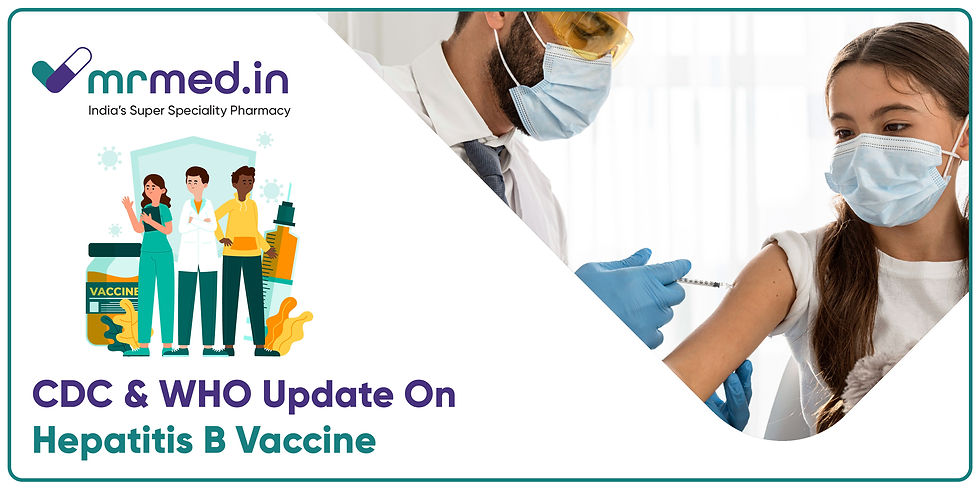Latest CDC & WHO Pediatric Hepatitis B Vaccine Guidelines
- Healthcare Tips

- Feb 18, 2025
- 4 min read

Hepatitis B is a serious liver infection that can affect people of all ages, but it is especially concerning for newborns and young children. To keep children safe, the Centers for Disease Control and Prevention (CDC) and the World Health Organization (WHO) have recently updated their guidelines for the pediatric Hepatitis B vaccine.
As a parent or caregiver, you might have several questions: When should my child get vaccinated? Is it safe? What are the risks of not getting the vaccine? Let’s dive into these details in simple terms so you can make the best decisions for your child's health.
Why is the Hepatitis B vaccine important for newborns?
Hepatitis B is a viral infection that attacks the liver. In newborns and infants, the infection is particularly dangerous because their immune systems are still developing. If a baby contracts Hepatitis B at birth, they have up to a 90% chance of developing chronic Hepatitis B, which can lead to serious liver problems like cirrhosis and liver carcinoma later in life.
The best way to prevent this is through early vaccination. The latest CDC and WHO guidelines emphasise the importance of giving the first dose of the Hepatitis B vaccine within 24 hours of birth.
What are the latest CDC & WHO recommendations?
The updated guidelines from both health organisations focus on early and complete vaccination to ensure lifelong protection. Here’s what parents should know:
First dose at birth – Given within 24 hours of delivery.
Second dose at 1–2 months old – Ensures continued protection.
Third dose at 6–18 months old – Provides long-term immunity.
For babies born to Hepatitis B-positive mothers, additional immune globulin (HBIG) injections may be required to further reduce the risk of infection.
These updated guidelines stress that on-time vaccination is crucial, as delaying the first dose increases the risk of infection.
Is the Hepatitis B vaccine safe for babies?
Yes, the Hepatitis B vaccine has been used for decades and has a strong safety record. Clinical studies show that the vaccine is highly effective and safe, with only little mild side effects in some infants, such as:
Mild fever
Soreness at the injection site
Temporary fussiness
Severe reactions are extremely rare. Health experts strongly recommend following the vaccine schedule because the benefits far outweigh the risks.
Can my child get Hepatitis B without the vaccine?
Yes. Hepatitis B spreads easily, and babies can be exposed in ways you might not expect. The most common routes of transmission include:
Mother-to-baby transmission at birth
Contact with infected blood (shared razors, toothbrushes, or open wounds)
Unsterilised medical equipment or unsafe injections
Casual household contact (in rare cases)
Since many people with Hepatitis B don’t show symptoms for years, it can spread unknowingly. Vaccination is the best way to ensure lifelong protection against the virus.
What happens if a child gets Hepatitis B?
Children who contract Hepatitis B are more likely to develop chronic infection, which can lead to serious liver diseases over time. Some possible complications include:
Liver inflammation (hepatitis symptoms) – Fever, fatigue, nausea, and jaundice
Chronic liver disease – Can lead to cirrhosis (scarring of the liver)
Liver cancer – Higher risk in chronic Hepatitis B cases
Because these risks are so high, early vaccination is strongly advised.
How is the Hepatitis B vaccine different from other hepatitis vaccines?
Many parents wonder about the difference between Hepatitis A, B, C, D, and E. Each type is caused by a different virus and spreads in different ways:
Hepatitis A – Spread through contaminated food/water; usually mild
Hepatitis B – Spread through blood & bodily fluids; can cause chronic infection
Hepatitis C – Mainly spread through infected blood; often leads to chronic liver disease
Hepatitis D – Affects only people with Hepatitis B; worsens liver damage
Hepatitis E – Spread through contaminated water; common in developing countries
Among these, Hepatitis B is one of the most dangerous, especially in children, which is why vaccination is so important.
Can the vaccine be given along with other childhood vaccines?
Yes! The Hepatitis B vaccine is often given alongside other injections & vaccines as part of routine childhood immunisation. This means your baby can receive multiple vaccines in one visit, reducing the number of trips to the doctor.
Combination vaccines also exist, where Hepatitis B is included with other childhood vaccines in a single shot, making the process even easier. One such combination vaccine is the Infanrix injection, which protects against multiple serious diseases in a single dose.
Are there any special precautions for premature babies?
Premature or low-birth-weight babies (less than 2 kg or 4.4 lbs) may need an extra dose of the Hepatitis B vaccine. Since their immune response is weaker, doctors recommend four doses instead of three to ensure proper protection.
If your baby is born prematurely, your paediatrician will guide you on the best vaccination schedule.
What should parents do next?
Ask your doctor about the Hepatitis B vaccine right after your baby is born.
Stick to the recommended schedule to ensure full immunity.
Don’t delay the first dose, as it is most effective when given within 24 hours.
Encourage family members to get tested, especially if they have never been screened for Hepatitis B.
With proper vaccination, your child can grow up protected and healthy, free from the risks of chronic liver disease.
Final Thoughts
The latest CDC & WHO guidelines highlight the importance of early Hepatitis B vaccination to protect children from serious liver disease. The vaccine is safe, effective, and essential in preventing lifelong complications.
If you have any concerns, talk to your paediatrician about the vaccine. Prevention is always better than treatment, and timely vaccination is the best way to safeguard your child’s health.
Comments